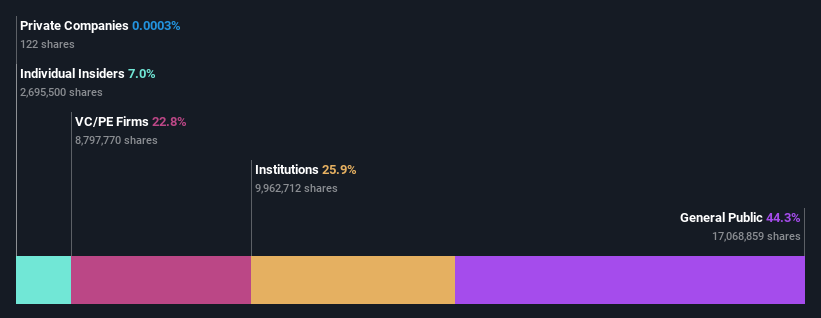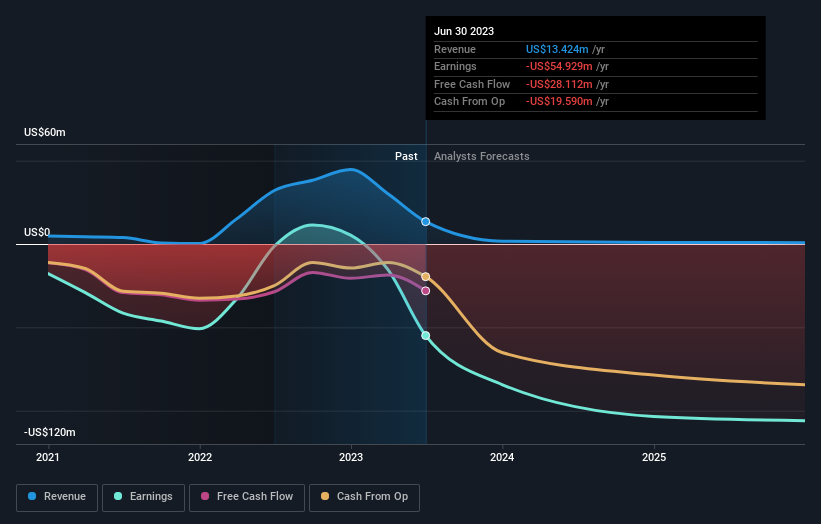Vaccitech plc (NASDAQ:VACC) surges 85%; individual investors who own 44% shares profited along with institutions
Key Insights
Significant control over Vaccitech by individual investors implies that the general public has more power to influence management and governance-related decisions
The top 5 shareholders own 50% of the company
To get a sense of who is truly in control of Vaccitech plc (NASDAQ:VACC), it is important to understand the ownership structure of the business. With 44% stake, individual investors possess the maximum shares in the company. That is, the group stands to benefit the most if the stock rises (or lose the most if there is a downturn).
Following a 85% increase in the stock price last week, individual investors profited the most, but institutions who own 26% stock also stood to gain from the increase.
In the chart below, we zoom in on the different ownership groups of Vaccitech.
See our latest analysis for Vaccitech
What Does The Institutional Ownership Tell Us About Vaccitech?
Many institutions measure their performance against an index that approximates the local market. So they usually pay more attention to companies that are included in major indices.
As you can see, institutional investors have a fair amount of stake in Vaccitech. This can indicate that the company has a certain degree of credibility in the investment community. However, it is best to be wary of relying on the supposed validation that comes with institutional investors. They too, get it wrong sometimes. When multiple institutions own a stock, there's always a risk that they are in a 'crowded trade'. When such a trade goes wrong, multiple parties may compete to sell stock fast. This risk is higher in a company without a history of growth. You can see Vaccitech's historic earnings and revenue below, but keep in mind there's always more to the story.
Vaccitech is not owned by hedge funds. The company's largest shareholder is Oxford Science Enterprises, with ownership of 23%. Meanwhile, the second and third largest shareholders, hold 13% and 6.5%, of the shares outstanding, respectively. William Enright, who is the third-largest shareholder, also happens to hold the title of Member of the Board of Directors.
Our research also brought to light the fact that roughly 50% of the company is controlled by the top 5 shareholders suggesting that these owners wield significant influence on the business.
Researching institutional ownership is a good way to gauge and filter a stock's expected performance. The same can be achieved by studying analyst sentiments. There are a reasonable number of analysts covering the stock, so it might be useful to find out their aggregate view on the future.
Insider Ownership Of Vaccitech
The definition of an insider can differ slightly between different countries, but members of the board of directors always count. Management ultimately answers to the board. However, it is not uncommon for managers to be executive board members, especially if they are a founder or the CEO.
Insider ownership is positive when it signals leadership are thinking like the true owners of the company. However, high insider ownership can also give immense power to a small group within the company. This can be negative in some circumstances.
We can see that insiders own shares in Vaccitech plc. As individuals, the insiders collectively own US$8.5m worth of the US$122m company. It is good to see some investment by insiders, but we usually like to see higher insider holdings. It might be worth checking if those insiders have been buying.
General Public Ownership
The general public, who are usually individual investors, hold a 44% stake in Vaccitech. While this size of ownership may not be enough to sway a policy decision in their favour, they can still make a collective impact on company policies.
Private Equity Ownership
With an ownership of 23%, private equity firms are in a position to play a role in shaping corporate strategy with a focus on value creation. Some investors might be encouraged by this, since private equity are sometimes able to encourage strategies that help the market see the value in the company. Alternatively, those holders might be exiting the investment after taking it public.
Next Steps:
It's always worth thinking about the different groups who own shares in a company. But to understand Vaccitech better, we need to consider many other factors. Be aware that Vaccitech is showing 4 warning signs in our investment analysis , and 2 of those are concerning...
If you would prefer discover what analysts are predicting in terms of future growth, do not miss this free report on analyst forecasts.
NB: Figures in this article are calculated using data from the last twelve months, which refer to the 12-month period ending on the last date of the month the financial statement is dated. This may not be consistent with full year annual report figures.
Have feedback on this article? Concerned about the content? Get in touch with us directly. Alternatively, email editorial-team (at) simplywallst.com.
This article by Simply Wall St is general in nature. We provide commentary based on historical data and analyst forecasts only using an unbiased methodology and our articles are not intended to be financial advice. It does not constitute a recommendation to buy or sell any stock, and does not take account of your objectives, or your financial situation. We aim to bring you long-term focused analysis driven by fundamental data. Note that our analysis may not factor in the latest price-sensitive company announcements or qualitative material. Simply Wall St has no position in any stocks mentioned.


